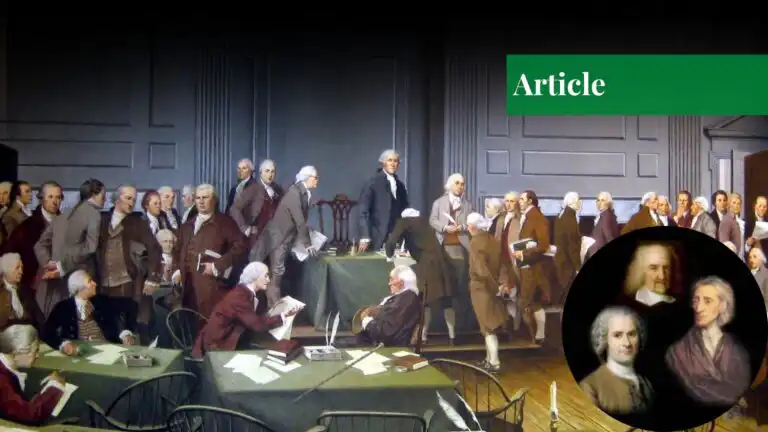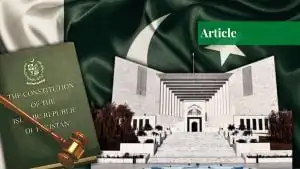What is Social Contract Theory?
The social contract theory grew in prominence between the 17th and 19th centuries. It was built upon morality and political theories and thus linked to the emergence of nation-states. Nevertheless, its origin is substantiated by the argument that man originally lived in a “state of nature,” i.e., describing the way of life before the formulation of state societies with social structures and norms. Life in the primordial state was oppressive, blissful, or compassionate, as acknowledged by different philosophers.
Despite such perspectives, the nature of life lacked legislative (lawmaking) and executive authority (enforcing laws) that could ensure that the individual’s rights, duties, and safety were secured and fulfilled. An agreement was drawn between the state and the individual to escape from the uncertainties brought by such a lawless society, i.e., The Social Contract Theory. Under this accord, the ruled had to sacrifice rights for protection and social order bestowed by the ruling authority or sovereign.
The contract was classified into two agreements:
Pactum Unionis—This pact was geared towards the formation of a unified society, i.e., the origin of a state whereby people lived in peace and harmony. It was to safeguard their lives and property.
Pactum Subjectionis—This pact reinforced the original contract whereby people submitted their rights to a legal authority, be it an individual or a group of individuals, which would ensure that their life, property, and liberty are protected and political order is maintained.
Philosophers of the Social Contract Theory
Henceforth, rational individuals decided to surrender rights in favour of order, which can be expressly defended by three philosophers: Thomas Hobbes, John Locke, and Jean-Jacques Rousseau.
Thomas Hobbes
“Homo homini lupus est”
A man is a wolf to another man.
– Thomas Hobbes
In the 16th century, Western philosopher Thomas Hobbes was among the first to acknowledge the idea of the social contract theory. The English writer’s political philosophy was based upon “Realism,” a constant state of anarchy, thereby in tandem with his idea of the state of nature, which was short, nasty, and brutish. It was characterized by a dog-eat-dog world in which self-interested individuals strived to increase their powers at the behest of others. According to Hobbes, such chaotic conditions endangered the security and order of society and made individuals desperate to avail themselves of protection and self-preservation no matter the cost.
In this regard, Hobbes supposed that men should enter into a contract with a sovereign, thus surrendering their rights and freedoms in exchange for protecting their life and property.
Thomas Hobbes’s perspective on social contract theory was expounded in his writings Leviathan, published in 1651. The ruler, Leviathan, has indivisible and absolute authority over his subjects, and he may use force as long as factional strife and discord are avoided. Generally, the sovereign exercises the principle of “Might is right,” and any law sanctioned by the ruler must be enforced with no questions asked in return.
In any case, if the contract is withdrawn, men will descend into the state of nature; henceforth, political authority must be cemented at all times to prevent this downfall. Hobbes constructed a provocative argument centered on absolutism, individualism, and materialism.
John Locke
“For all in the states of created beings, capable of laws, where there is no law, there is no freedom.”
– John Locke.
The English philosopher of the 17th century, John Locke, differed from Hobbes and was the proponent of Liberalism. He promoted the three cardinal rights: life, liberty, and property, which later inspired popular revolutions in France and the establishment of the Declaration of American Independence (1776). In his vision, the state of nature was one of equality, freedom, and independence, as highlighted in his seminal work “Two Treatises of Government” (1689). In this Golden Age, nature granted men rights, so an environment of co-existence and goodwill was witnessed.
Sure, a state of liberty was witnessed, but herein lay the problem: The laws granted by nature were not secure or protected. Individuals had no license over property as no legitimate authority constituted laws, executed them, and then interpreted them. Hence, we can say that legislative, executive, and judicial administration were missing. In this regard, a social contract was erected to protect said property.
Contrary to Hobbes, rights were not surrendered under this agreement. Still, authority was deposed to an individual or a group of individuals under the people’s express consent to maintain, preserve, and enforce the law of nature. Governments functioned around pursuing the public good and implementing retributive mechanisms to prevent law violations.
Furthermore, John Locke’s conception maintained that, as the government was based on majoritarianism, if it failed to fulfil its role in protecting rights, individuals had the right to revolt and bring in a new administration. In practice, the components of Locke’s social contract theory have inspired modern democratic principles in the West.
Jean-Jacques Rousseau
“Man is born free, but everywhere he is in chains.”
– Jean-Jacques Rousseau.
The formidable French Philosopher Jean-Jacques Rousseau, who lived in the 18th century, was the first person to coin the term social contract. His notable works, ‘The Social Contract’ and ‘Emile ‘ in 1762, highlighted his outlook on a renewed social contract based on the freedom and liberty of the individual. His principles were soon applied to revolutionary politics, as witnessed in America and France.
In addition, in Rousseau’s view, people in the state of nature led solitary lives, content with nature’s abundant resources to fulfil their basic needs. They had compassion and morals and were free to do as they pleased. But as society progressed and discoveries and inventions were made, the mediocre lifestyle was swapped with a complex one.
State institutions were established, and the ‘noble savage’ of the primitive era adopted political values. Moreover, the appearance of private property led to the division of labour, officially cementing humanity’s fall from grace. This can be attributed to increased comparisons made by individuals who manifested unwanted emotions, i.e. envy, pride, and contempt. Therefore, the pure state was replaced with social contracts and laws.
Rousseau believed that the social contract had corrupted mankind with greed, inequality, and vice. He proposed that since the change from a state of nature to modern civilization is irreversible, a renewed contract would be inculcated whereby authority is granted to a government under the ‘General Will’ of the populace to exercise the notions of rights, liberties, freedom and equality, and assembly. Henceforth, freedom of expression was granted through a law conformed to people’s will. The majority is authority, and in the new social contract, the general will was infallible and illimitable.
Comparative Analysis
| Philosopher | State of Nature | Social Contract | Sovereignty |
| Thomas Hobbes | A state of perpetual conflict | A powerful centralized authority to guarantee peace. | Absolute – Leviathan having unchecked power. |
| John Locke | State of freedom and equality | To protect natural rights i.e. life, liberty and property. | Limited – Government of majoritarianism. |
| Jean-Jacques Rousseau | State of compassion and freedom | Erasure of equality and destruction of person’s humanity – A new social contract promoting civil liberties and equality. | Popular – Rule of General Will, interest of all. |
Critical Aspect
The veritable construct of social contract theory does face critical apprehension from the scholastic community. Though a social contract is witnessed today in the form of a constitution, the quixotic nature presented by philosophers is entirely too repugnant to contemporary political societies. More so, critics argue that the state of nature is a hypothetical construct altogether ignorant of the concept of human social evolution.
Furthermore, social contract theory is widely understood as promoting a post-colonial narrative while discarding minorities such as women and non-European societies. In this regard, Hobbes and his absolutist theorem of government are impractical, as the outright elimination of civil liberties can do more harm than good. Moreover, it has been assumed that Locke’s idea of laissez-faire is misleading as it is not welfare-oriented.
Additionally, Rousseau’s social contract limits minority consensus as the general will signals an absolutist regime. His renewed social contract is paradoxical and unreal in the face of eradicating corruption.
Conclusion
The social contract theory by Thomas Hobbes, John Locke, and Jacques Rousseau has provided a fundamental insight into human society and governance. Despite the differences and criticisms, it has proved to be an essential tool in the current state of affairs by providing an environment where the rights of individuals are protected and justice and equality are encouraged.
In this regard, the insights of the above philosophers are meant to achieve the maximum good and benefit of all people. Still, we can’t deny that they are immeasurably idealistic and, in some cases, problematic. We don’t have to follow in their footsteps entirely, but it has inspired debates in modern civilization. In any case, the social contract between the state and the individual is the basis of the state system. Only how we navigate through the symbiotic relationship is important in the long run.
If you want to submit your articles and/or research papers, please visit the Submissions page.
To stay updated with the latest jobs, CSS news, internships, scholarships, and current affairs articles, join our Community Forum!
The views and opinions expressed in this article/paper are the author’s own and do not necessarily reflect the editorial position of Paradigm Shift.






